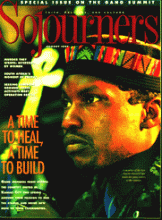AS A JEWISH longtime Sojourners subscriber, I would like to comment on Wes Howard-Brook's article, "Undermining the Power of the Law," in your May 1993 issue.
One of the examples the writer uses of undermining the law is John 5:8. Jesus tells the man by the poolside to get up, pick up his mat, and walk. The specific Sabbath violation here is the picking up of the mat, this being a form of work presumably forbidden on the Sabbath. The accusation against Jesus is even more tendentious, as all he did was tell the man to do something regarded as a violation. The real offense, however, as Howard-Brook goes on to explain, is "What is more important -- the keeping of 'God's law' or the act of healing?"
Now let us assume, as Howard-Brook does, that this was an act of healing. Jewish law specifically provides that Sabbath laws are to be broken to save a person's life (even an animal's). A midrash in Mechilta Shabbatas 1 states: "We should disregard one Sabbath for the sake of saving the life of a person, so that he may observe many Sabbaths."
The difficulty most non-Jewish theologians have in interpreting passages like John 5:8 is that they think that Jewish law is either what the apostles say it is, or what they read in the Tanach (Old Testament). To understand Jewish law one must be familiar with the oral law, mishnah, as well as the written law in the Torah. This is to be found in the Talmud and is based on midrashim, exegeses of various kinds intended to clarify exact points of law (something like the way case law clarifies statutes); in the case at hand, for example, clarifying exactly what can and cannot be done on the Sabbath.
Read the Full Article
